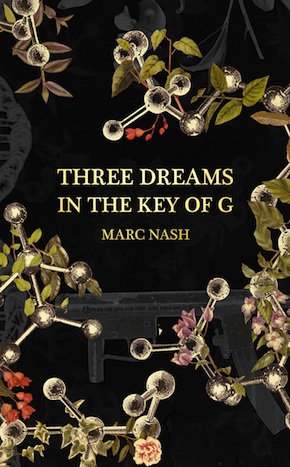City limits
by Marc Nash
“A tour de force of advanced literature… challenging and rewarding in equal measures.” Guardian Not the Booker prize 2018
They say everybody has at least one book inside them.
I know I did once. The only question back then was which language it would be written in. I’ve introduced you to the in-laws, now meet my parents. Like the husband’s family, we all were born, live and will almost certainly die within the confines of Omagh, market town in County Tyrone, Northern Ireland. I don’t know if it’s actually coded for in our DNA, but here, your life decisions are certainly selected for you; the physical limits heritable.
As a youngster I used to cycle like I was possessed. Trying to flee these city limits, to discover a pure restorative oxygen for lungs aerobically compromised, not by exertion, but by the fug of small-town prejudice. But everywhere I went it was writ large and cloned larger. My escape velocity was always spiked by the barbed wire of sectarianism, counteracted by citizen barricades and retarded by army checkpoints. Newton’s first law of motion. And here, certainly, was limitless friction to impede you. Grind you into inertia.
I never did breach the ever-receding town limits. (I won’t even add the policing action by my family back home into the equation of subtraction. A young girl out alone on her bike? What if she were to get a puncture?) Our town and all towns in the Six Counties, for that matter, have thunderously disproved Newton’s third law of motion; when a force acts on a body, an equal and opposite force does not perforce act simultaneously on another body. The crab apple of revenge escalation must have fallen too far from the tree to have bopped him on his periwigged crown. See, sometimes it can take, ooh, easily a matter of minutes to retrieve a gun from a secret stash. All one has to do is round up a gaggle of kids and some stones to conceal your actions. Oh me, Omagh. Such a midden, I’m surprised they bothered to name it at all.
I was once granted a chance of finally ditching this house of correction. Queen’s University, Belfast. To study linguistics and ancient languages. I was particularly struck by Ogham script. More a system of striated lines than what we recognise as letters. A tendril spanning between runic and alphabetic characters. I don’t know if it’s actually coded for in our DNA, but here your life decisions are certainly encrypted for you; the physical limits heritable. I mean, Ogham is a bloody anagram of Omagh for crying out loud! The same five letters, just sequenced in a different order. Still, I dared venture that I was about to undertake the odyssey of my life. When all the time I was preordained to remain at home, spinning gold into straw. Staying loyal to my own and resisting the importuning of each and every suitor with which the world could tempt me. About three at the final count.
Dad always backed the grey horse in any race. Whatever the odds. Game of fluctuation and chance, sure, why not try and inject some constancy? What dope needs form, breeding and race conditions?”
While school exam papers were being assessed, my family were making assessments of their own. Risk assessments. The larger picture of small-town little girl in the big city, that kind of thing. I mentioned that my in-laws liked to bet. Why not, after all I firmly believe the fluttering gene is something all the races of Ireland inherited from a common aleatoric atavist. Such tidings would incite both lots to go nap! A throwback to times when the only bones of contention were those being cast and rolled at the foot of the Cross. Eyes down for the main chance. And while our novice Lord chanced to look up to the heavens from behind his blinkers, they had the shroud off his back.
Well, if the in-laws launched the odd flier, my family liked to speculate. Dad always backed the grey horse in any race. Whatever the odds. Game of fluctuation and chance, sure, why not try and inject some constancy? What dope needs form, breeding and race conditions when you can chuck pure arbitrariness into the pot? Wouldn’t stir it much, though. The solitary book my family could make was a ghost-written money-spinner for their turf accountant.
I don’t know, maybe my father was actually ahead of the field. Perchance he’d unwittingly intuited a scientific truth to rewrite the pre-historical form guide, hit upon a DNA strain containing the variable allele coding for grey pigmentation, unfolding it back, back, way back to the first accidental mutation yielding that allele. And it just happened to be in some sort of a ‘superhorse’. Maybe a horse with another genetic mutation for swifter glucose release, or greater aerobic capacity, or more efficient muscular recovery tensions. And always passed on down the line in greys. Or maybe it just had an allele providing a greater rectal capacity for shitting on you.
Finally, the man who always bet on the grey completed his risk assessment for me. In dichromatic black and white. His stark speculation decreed that it would be too dangerous for me to go to Belfast. Too threatening out on the streets and the subtext of too hazardous a chance of religious miscegenation with some Taig. Caught him bare-faced in a red-handed lie. But even this I knew not to be the prime mover in circumscribing me. “You know, there is such a thing as too many dead languages.” I think he felt I had already gone some way over the side. Greek and Latin (scrub my mouth out with carbolic) were bad enough. But Ogham had some proximate link to Celtic culture (that is, the older bunch of Scottish immigrants to our isle, as against the more recent stock from which we were extracted). And that had to be expunged right here and now. Switch off the Catholic to conquer and rule. Zap the teratoma before it spread inside their own cell walls. Their prescribed dose of chemotherapy was enough to make anyone tear their hair out. Meta stasis.
They did manage to move me out from home soon after, however. I was married off to a local boy, my husband. Not quite a shotgun wedding, since I wasn’t pregnant, and I managed to countermand the paramilitary salute of rounds fired into the air. We settled on walking under a triumphal marriage arch of hecklers and kochs. But the bastards’ balaclavas didn’t match the bridesmaids’ dresses.
(Some of the above is fictional. I’ve got the hump with my husband, a.k.a the troubles [small ‘t’], right at this period in time.)
Part of me was cheerfully complicit anyway, since at least I was removed from their immediate sphere of pare-rental control. A few streets away at least. Far enough to have a different local boozer. Not quite my dream of another town. And not quite my idea of freedom either. Small town mentalities have led to the perfection of Jeremy Bentham’s panopticism. Albeit a net curtain panoptica. Nowhere are you free of the potential of being under observation, though of course at any one moment, you do not know if you are being scrutinised. Soviet Russia employed it on a large scale I believe; though I wouldn’t know, since I have never visited there. Or anywhere. Since I have never passed through a single port.
(Mind you, panopticism does not work. I mean, the army watchtowers here still can’t prevent things happening on the ground, can they? This lattice of Babel Towers, looming hunched giants, merely shrugging their own baffled fi, fie, foe, fum along the skyline. Their oppressive, penal imagery is all encompassing. You can see how the other side may have a point there.)
I can see it in Suzanne already. At four years of age. The indelible impress of my overanxiety. The imprinting of our habitat. An inbred sense of threat.”
Having submissively allowed social expectation to tamp down every one of my instinctual attempts at self-definition, I meekly succumbed to the most dominant yet self-effacing instinct of them all. Motherhood. And I instituted a panoptic system all of my own to vouchsafe the safety of my little girl. Only she really was being watched all hours of the day and thereby I incarcerated myself, since I didn’t know any better and I certainly didn’t know any different.
I can see it in Suzanne already. At four years of age. The indelible impress of my overanxiety. The imprinting of our habitat. An inbred sense of threat. Her father would be so proud, if he had even an inkling. How she cannot bear conflict. Covers her eyes with her small hands, but she cannot eclipse it in darkness indefinitely. For I know what she sees. Some rebarbative relative, visage contorted in a rictus of sectarian hate, breathing fiery vitriol that illuminates the red blood vessels of her eyes. Searing. That is too powerful. Her brain emptied of everything but red. Red is visual danger. Tinged entirely green. Red-green colour blindness, of the genetic variety, is usually restricted to boys. The Chinese bind the feet. We bind the whole of ourselves. The inner judge now in place on his bench. Clad head to foot in red. Even his ermine is bloodstained. He will legislate from now on jus prudence for my Suzanne. She will merely play his tremulous usher. And if ever she feels the urge to legislate for herself, little pinpricks of guilt will stab her. Redden her skin. Since it is the underside of her flesh which burns, she will appreciate that she must be doing it to herself. The paternity suit passed on through the mother’s susceptibility.
Most, if not all, parents like to dream on ahead for their offspring. To fantasise and speculate how they will develop and fare. Not here in Ulster. They get call-up papers with their birth certificates. It’s safer to blow your investments and your hopes on the gee-gees.
from Three Dreams in the Key of G
 Marc Nash has published five collections of flash fiction and four novels, all of which look to push narrative form and language. He also works with videographers to turn some of his work into digital storytelling. He lives and works in London. Three Dreams in the Key of G, published by Dead Ink, is the final ‘wildcard’ entry in the Guardian‘s Not the Booker prize 2018.
Marc Nash has published five collections of flash fiction and four novels, all of which look to push narrative form and language. He also works with videographers to turn some of his work into digital storytelling. He lives and works in London. Three Dreams in the Key of G, published by Dead Ink, is the final ‘wildcard’ entry in the Guardian‘s Not the Booker prize 2018.
Read more
Guardian: Not the Booker Prize
sulcicollective.blogspot.com
@21stCscribe

